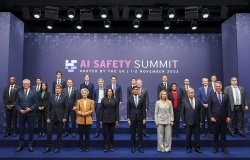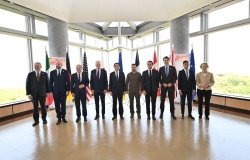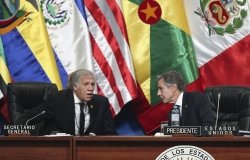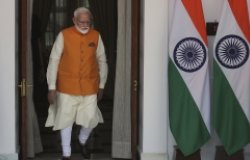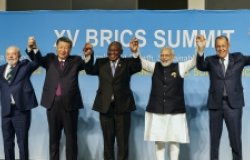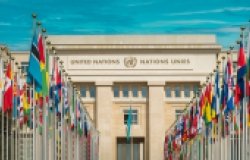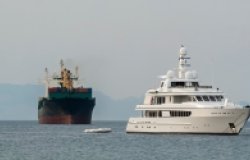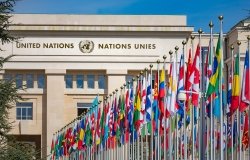295. European Integration and Ethnic Reconciliation in Croatia and Serbia
Nicole Lindstrom is Assistant Professor of International Relations and European Studies at the Central European University in Budapest and a JSTS alumna. She participated in the Niarchos Roundtable on "Overcoming Religious Nationalism in the Balkans," held on December 5, 2003. The following is an updated summary of her presentation. Meeting Report 295.
Barely one week before the European Union's biggest enlargement ever on May 1, 2004, the European Commission gave Croatia the green light to open formal accession negotiations for EU membership. Croatian Prime Minister Ivo Sanader toasted the news with champagne in Zagreb, declaring: "Today we turn a new page in history." The Commission's decision is a remarkable turnaround for a country that was mired in violent conflict a decade ago and diplomatically isolated for most of the 1990s. It is significant as well that Sanader, elected in December 2003 when the Croatian Democratic Union (CDU) resumed power, celebrates this historic moment. The nationalist policies of his party's founder, Franjo Tudman, thwarted Croatia's European aspirations throughout the 1990s. CDU leaders and their supporters continued in recent years to undermine the previous regime's commitment to meeting EU conditions, namely turning over indicted war criminals to the International Criminal Tribunal for the former Yugoslavia (ICTY). The election of the CDU in December 2003 thus provided an important test for whether changes brought about by the EU's accession process are enduring. By fulfilling his pledge to make a clear and determined effort to enter the EU, even at the expense of marginalizing nationalist factions, Sanader appears to have turned a new page.
European leaders hailed the Commission's decision as an important step towards boosting democracy and ethnic reconciliation in the Western Balkans, with the hope that neighboring Serbia and Montenegro will take a cue from the Croatian example. The EU accession process has clearly not achieved the same political results in Serbia and Montenegro. While Milosevic's successors were quick to turn over Milosevic to the ICTY, they have actively resisted further cooperation with the Tribunal—a main obstacle to submitting an application for EU membership. Some observers argue that the pressure exercised by the Tribunal, and by extension the EU, on the government contributed to the strong showing of nationalist parties in the December 2003 elections. Serbia and Montenegro are now mired in political instability, continued ethnic violence and relative international isolation. EU membership remains a distant prospect.
How can we understand these diverging paths to European integration in Serbia and Croatia over the past four years? The significant benefits of EU membership create conditions for unprecedented influence on the domestic politics of aspiring members. Yet domestic politics also determine how ruling elites respond to these conditions and incentives. Ruling elites in Serbia and Croatia have varied significantly in their commitment and ability to subvert radical nationalist factions that continue to jeopardize their citizens' overwhelming desire to be fully integrated into Europe. Religious leaders have certainly been complicit in contributing to or legitimizing ethnic nationalism and conflict plaguing the region over the last decade—supported by Karadzic's notorious remark: "not a single important decision was made without the Church." Yet contrary to some popular accounts, religious communities in the Balkans are neither a priori prone to exclusion or inclusion, nor to conflict or reconciliation. The role of religion in society largely depends on current societal interpretations and political opportunities. The cases of Croatia and Serbia illustrate how the pull of EU membership can help constrain obstructionist religious factions and enable religious leaders to play a constructive role in bringing about peace and reconciliation in the Balkans.
* * *
In April, SFOR raided a Serbian Orthodox residence in Pale believed to be harboring indicted war criminal Radovan Karadzic. The incident attracted media attention to the number of indicted criminals still at large, as well as the alleged complicity of the Church in preventing their capture. While condemning the operation for critically injuring a priest and his son in the raid, Archbishop Pavle quickly issued a statement that the Orthodox Church "is not, and should not be, assisting war criminals." Paddy Ashdown, High Representative to Bosnia and Herzegovina, seized on the opportunity to publicly urge Pavle to use all his influence, and the influence of the Church, to ensure that Karadzic and remaining Serbian indictees are turned over to the ICTY.
The public exchange highlighted the role of Serbian Orthodox Church in hindering or aiding cooperation with the Tribunal. The church has been blamed for the lack of progress in facing war crimes committed in recent conflicts, as well as actively protecting indicted war criminals such as Karadzic and General Ratko Mladic. After recently returning from The Hague to provide pastoral care to detainees, one clergyman publicly proclaimed that he was honored to have been able to "kiss the hands of men who fought for the Serbian people and their fatherland." At the Orthodox ceremony held as part of assassinated Prime Minister Zoran Djindjic's funeral, the Bishop of Montenegro gave an inflammatory political speech that prompted a public outcry. Serbian human rights activists condemned the speech as a "dark voice from the past" and argued that the Serbian Orthodox Church "remains firmly entrenched in the Milosevic regime." The Helsinki Committee on Human Rights in Serbia argued that his words were "in reverse proportion to Serbia's interest to harmonize relations with its neighbors, begin to meet its obligations to the international community without hesitation and be integrated into Europe—thus in reverse proportion to interests of its citizens."
In Croatia, a section of the church hierarchy has long supported nationalist calls for blocking cooperation with The Hague tribunal and the suspension of war crimes trials in domestic courts. The rift between the strong conservative, nationalist wing and the Western oriented, progressive part came to a head in 2001 when the nationalist wing campaigned against the Racan government over the issue of ICTY cooperation. The Bishop of Gospic warned the government and parliament to "beware lest they find their seats up in the air" for, as he put it, "he who undermines the former president, generals and defenders of Croatia, undermines the very foundations of the Croatian state." The Croatian military bishop, Juraj Jezerinac, a former Croatian émigré to Canada, has long agitated against the ICTY, regularly visiting detained indicted suspects and enthusiastically joining rallies organized in support of General Gotovina. A group of priests mainly from Dalmatia published a letter in 2002 against the Racan government declaring that the Church was ready for open "confrontation with the ‘Reds' and their militant atheism and anticlericalism."
The church's aggressive stance towards the Racan government stemmed not only from the liberal government's willingness to hand over indicted war criminals; Racan also began to threaten the symbiotic relationship between the Catholic Church and the state fostered by Tudjman. The center-left government improved relations with other religious groups, especially the Serbian Orthodox Church. The Government passed a Law on Legal Status of Religious Communities, which broadly defines religious communities' legal position, and covers such issues as government funding, tax benefits and religious education in schools. They signed agreements with the Serbian Orthodox Chruch and the Islamic Community to receive the same state support and other benefits established in concordats between the Tudjman government and the Vatican.
European Union countries urged the Vatican to put pressure on the Croatian Catholic Church to moderate its opposition to the center-left government of Stipe Mesic and Ivica Racan and withdraw support from right wing nationalists. In his June 2003 visit to Croatia, Pope John Paul II met with members of the Serbian Orthodox, Protestant, Jewish and Islamic communities and called for ethnic reconciliation and peaceful coexistence. The Pope also encouraged the Croatian government to meet the conditions for full European integration and pledged the Vatican's support in achieving this aim. Pressure from the EU and support for the Vatican bolstered less nationalist wings of the Catholic Church. Zagreb Archbishop Josip Bozanic voiced support for the Racan regime's cooperation with the ICTY, expressing publicly his understanding for government decisions made in relation to the Tribunal. In January 2003, Bozanic publicly endorsed Croatia's EU membership aspirations after meeting with Romano Prodi, President of the European Commission. Bozanic remarked after the meeting that "The Catholic church in Croatia was always oriented towards Europe," adding that in the "former communist Yugoslavia, when the regime wanted to separate it from other churches in Europe, the Croatian Church always stressed its unity with Europe."
The EU made full cooperation with the Tribunal, as well as refugee return and regional cooperation, political condition in opening membership negotiations with Croatia. The return to power of the CDU in December 2003 confirmed the return to power of nationalists across Yugoslavia, some moderate and some extreme. Sanader assured skeptical observers that he had expelled many of the party's traditional extreme wing and forged a moderate, mainstream European conservative party. In response to criticisms about the Church's support of the CDU in the elections—such as the distribution of voting guides urging parishioners to vote against parties in support of legalization of euthanasia, homosexual marriage, and abortion (which CDU is against)—Sanader declared, "I am fully in favor of secularization, and clear separation between Church and State."
Once in power, Sanader confirmed his commitment to facilitating the return of Serb refugees, cooperating with the Tribunal—turning over at least 20 indicted suspects—and leading Croatia into NATO and the EU. With Brussels's recent decision, Croatia might now be seen as having moved beyond the destructive nationalism still plaguing other countries in the region. For Croatia to serve as a positive example for other states in the region, such as Serbia and Montenegro, the EU must continue to pressure Croatia to meet its commitments to full cooperation with the Tribunal and to eliminate the barriers to Serb refugee return. The EU must also make a credible commitment to further enlargement in order to make more tangible the rewards of domestic political change.
* * *
How can this process enable the ongoing efforts of many religious communities and leaders in bringing about domestic political change and ethnic reconciliation in the region? Religious communities in Serbia, Croatia and other former Yugoslav states offer plenty of commendable examples of initiating inter-religious regional cooperation. Examples include the opening of an inter-religious cultural center in northern Serbia and the recent opening of an ecumenical center in Belgrade. The year 2003 also marked high-level meetings between representatives of the Vatican and the Serbian Orthodox Church where officials called for reconciliation and repentance. Human rights groups call on church leaders to condemn attacks on minority groups, from repeated vandalism of Orthodox churches in the southern and eastern parts of Croatia to the acts of vandalism against the Roman Catholic cemetery in Vojvodina. The EU should invite religious leaders to play a role not only in reconciliation, but involving them as important societal actors in the EU accession process. Javier Solana, High Representative for the EU's Common Foreign and Security Policy, began such a process. Recently meeting with a group of religious leaders from Belgrade, Sarajevo, Ljubljana and Zagreb, he declared that religious leaders have an important role to play in enhancing regional co-operation, stability and development in the whole region. Finally the symbiotic relationship between nationalist politics and religious communities forged throughout the 1990s must be disentangled, encouraging religious pluralism as an important feature of healthy civil society.
About the Author
Nicole Lindstrom
Read More
Global Europe Program
The Global Europe Program is focused on Europe’s capabilities, and how it engages on critical global issues. We investigate European approaches to critical global issues. We examine Europe’s relations with Russia and Eurasia, China and the Indo-Pacific, the Middle East and Africa. Our initiatives include “Ukraine in Europe” – an examination of what it will take to make Ukraine’s European future a reality. But we also examine the role of NATO, the European Union and the OSCE, Europe’s energy security, transatlantic trade disputes, and challenges to democracy. The Global Europe Program’s staff, scholars-in-residence, and Global Fellows participate in seminars, policy study groups, and international conferences to provide analytical recommendations to policy makers and the media. Read more

